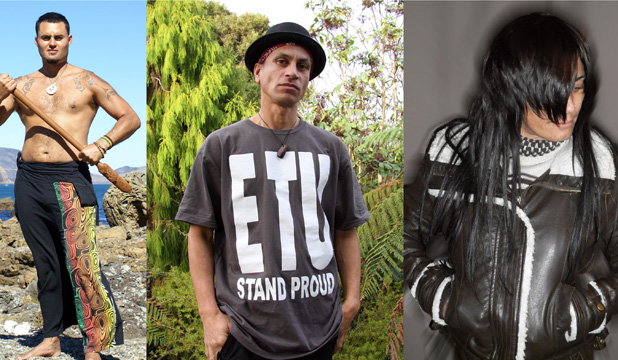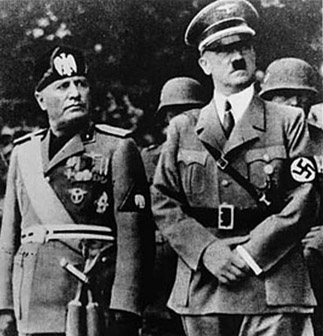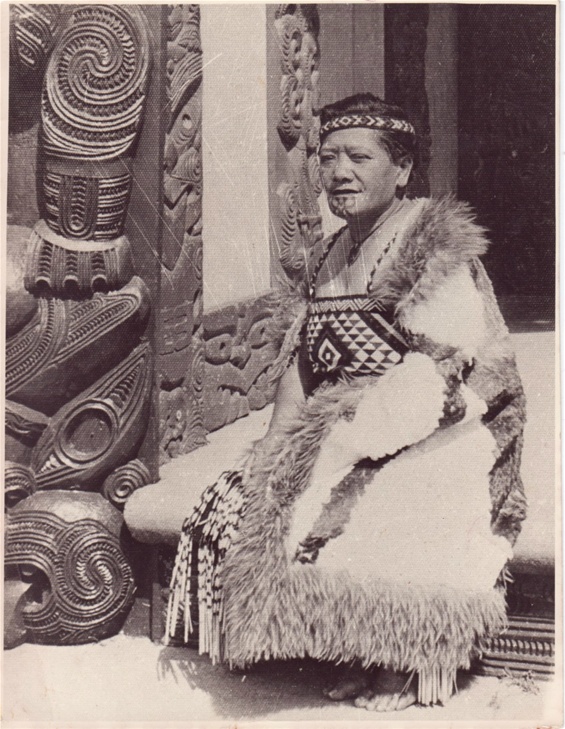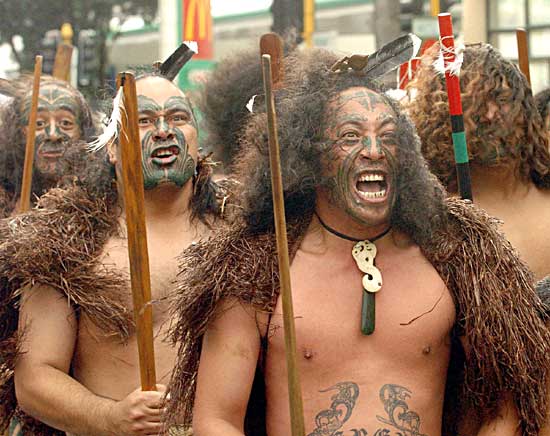Bella Ciao
Anonymous

81. Pae o riri (La Bella Ciao māori di Moana Maniapoto – Moana & The Tribe -2011-)
81. Pae o riri (The Māori Bella Ciao by Moana Maniapoto – Moana & The Tribe -2011-)
Più che una vera versione di “Bella ciao”, si tratta di una canzone ispirata da quest'ultima, e che ne mantiene la melodia. La canzone riflette tematiche culturali tipicamente māori, ma non tradisce comunque l'afflato universale della canzone originale. Per questo la canzone viene qui inserita con una traduzione inglese in nota: il testo sembra chiaramente riferirsi ai soldati neozelandesi Māori che combatterono nell'ANZAC durante la Grande Guerra in Europa, in forma di una "lettera agli italiani" dove si chiede loro di avere cura dei giovani soldati māori come fossero i loro figli. Il testo māori è di Moana Maniapoto; la traduzione inglese di Scotty Morrison.
"Inspired by the Italian partisan song "Bella Ciao" ,... (Continues)
81. Pae o riri (The Māori Bella Ciao by Moana Maniapoto – Moana & The Tribe -2011-)
Più che una vera versione di “Bella ciao”, si tratta di una canzone ispirata da quest'ultima, e che ne mantiene la melodia. La canzone riflette tematiche culturali tipicamente māori, ma non tradisce comunque l'afflato universale della canzone originale. Per questo la canzone viene qui inserita con una traduzione inglese in nota: il testo sembra chiaramente riferirsi ai soldati neozelandesi Māori che combatterono nell'ANZAC durante la Grande Guerra in Europa, in forma di una "lettera agli italiani" dove si chiede loro di avere cura dei giovani soldati māori come fossero i loro figli. Il testo māori è di Moana Maniapoto; la traduzione inglese di Scotty Morrison.
"Inspired by the Italian partisan song "Bella Ciao" ,... (Continues)
E te toa ranginamu [1]
(Continues)
(Continues)
Contributed by Riccardo Venturi 2020/11/23 - 10:07
נרקוד לשלום

32. MAORI DELLE ISOLE COOK / Cook Islands Maori
Tongiariki Turaki
Tongiariki Turaki
KA URA TATOU MA TE ' AU
(Continues)
(Continues)
Contributed by Riccardo Venturi 2017/8/26 - 10:08
E tu

Maori Lyrics: 2002
Testo maori: 2002
[Lyrics and Music by Dean Hapeta]
[Testo e musica di Dean Hapeta]
Mixed Maori/English lyrics: 1988
Testo misto maori/inglese: 1988
A Maori warrior claims new territory
by Kerry Buchanan, Unesco Courier, July-August 2000
"Nigger!" The biker's insult blindsided the eight-year-old boy, shattering his vision of both Maori and pakeha (white) society in Aotearoa, the original name of New Zealand. The verbal attack sharpened the boy's awareness of his society's colour lines. Afterwards, he couldn't stand the sight of his fellow Maori cast as the peaceful but subordinate native.
Nor could he look up to indigenous gangs in his working-class neighbourhood of Upper Hutt, outside the capital Wellington. Turning to white society, he felt oppression. So the boy began to look inward, to imagine a "new breed" -proud of his Maori past and committed to a radical... (Continues)
Testo maori: 2002
[Lyrics and Music by Dean Hapeta]
[Testo e musica di Dean Hapeta]
Mixed Maori/English lyrics: 1988
Testo misto maori/inglese: 1988
A Maori warrior claims new territory
by Kerry Buchanan, Unesco Courier, July-August 2000
"Nigger!" The biker's insult blindsided the eight-year-old boy, shattering his vision of both Maori and pakeha (white) society in Aotearoa, the original name of New Zealand. The verbal attack sharpened the boy's awareness of his society's colour lines. Afterwards, he couldn't stand the sight of his fellow Maori cast as the peaceful but subordinate native.
Nor could he look up to indigenous gangs in his working-class neighbourhood of Upper Hutt, outside the capital Wellington. Turning to white society, he felt oppression. So the boy began to look inward, to imagine a "new breed" -proud of his Maori past and committed to a radical... (Continues)
Karanga, rangatahi, whakarongo, whakarongo
(Continues)
(Continues)
Contributed by Rikuratu Wenaturi 2014/8/10 - 10:44
Hitara waha huka

[1943]
Testo/Lyrics: Tuini Ngawai
Musica/Music: Tuini Ngawai
("Click, Go to the Shears")
Non molto tempo fa avevamo proposto una canzone, The Gold in Africa di Neville Marcano « The Tiger » proveniente da Trinidad e Tobago : un calypso composto all'epoca dell'aggressione fascista italiana all'Etiopia, rivolto espressamente contro Benito Mussolini. Un'autentica particolarità che oggi ripetiamo spingendoci ancor più lontano : nell'antipodale Aotearoa, vale a dire il nome con cui il popolo Maori designa la propria terra, la Nuova Zelanda. Lo facciamo con questa canzone della più grande cantrice moderna Maori, Tuini Ngawai, che nel 1943 compose nella sua lingua questa waiata che derideva Hitler e Mussolini. Bisogna a questo punto fare un piccolo inciso sulla lingua Maori, che ha una fonetica sconcertantemente semplice : ricchissima di vocali brevi e lunghe (che le danno il suo andamento... (Continues)
Testo/Lyrics: Tuini Ngawai
Musica/Music: Tuini Ngawai
("Click, Go to the Shears")
Non molto tempo fa avevamo proposto una canzone, The Gold in Africa di Neville Marcano « The Tiger » proveniente da Trinidad e Tobago : un calypso composto all'epoca dell'aggressione fascista italiana all'Etiopia, rivolto espressamente contro Benito Mussolini. Un'autentica particolarità che oggi ripetiamo spingendoci ancor più lontano : nell'antipodale Aotearoa, vale a dire il nome con cui il popolo Maori designa la propria terra, la Nuova Zelanda. Lo facciamo con questa canzone della più grande cantrice moderna Maori, Tuini Ngawai, che nel 1943 compose nella sua lingua questa waiata che derideva Hitler e Mussolini. Bisogna a questo punto fare un piccolo inciso sulla lingua Maori, che ha una fonetica sconcertantemente semplice : ricchissima di vocali brevi e lunghe (che le danno il suo andamento... (Continues)
Hitara waha huka, upoka maro,
(Continues)
(Continues)
Contributed by Riccardo Venturi 2014/8/9 - 13:42
Arohaina mai

[1940]
Written by Tuini Ngawai
Scritta da Tuini Ngawai
"This is regarded as Tuini Ngawai's greatest composition. She wrote it when the men of C Company, 28th (Maori) Battalion were departing from the East Coast for the battlefields of World War II."
"Tuini Ngawai regarded Arohaina Mai as her best composition although she is reputed to have written the words in a few minutes. She wrote it in 1940 following a church service for the men of C Company (Ngati Porou) of the Maori Battalion, and it was first sung publicly at a farewell for them at Tokomaru Bay. It was performed there by her own group, the well-known Te Hokowhitu-a-Tu Concert Party.
It was regarded by many as her masterpiece and an outstanding classic of Maori songwriting; it caused Sir Apirana Ngata to hail Tuini as a composer of genius. The song became the Maori Battalion's unofficial hymn.
Tuini developed the tune from a... (Continues)
Written by Tuini Ngawai
Scritta da Tuini Ngawai
"This is regarded as Tuini Ngawai's greatest composition. She wrote it when the men of C Company, 28th (Maori) Battalion were departing from the East Coast for the battlefields of World War II."
"Tuini Ngawai regarded Arohaina Mai as her best composition although she is reputed to have written the words in a few minutes. She wrote it in 1940 following a church service for the men of C Company (Ngati Porou) of the Maori Battalion, and it was first sung publicly at a farewell for them at Tokomaru Bay. It was performed there by her own group, the well-known Te Hokowhitu-a-Tu Concert Party.
It was regarded by many as her masterpiece and an outstanding classic of Maori songwriting; it caused Sir Apirana Ngata to hail Tuini as a composer of genius. The song became the Maori Battalion's unofficial hymn.
Tuini developed the tune from a... (Continues)
Arohaina mai
(Continues)
(Continues)
Contributed by Riccardo Venturi 2014/7/31 - 11:50
L'Internationale

MAORI / MAORI
La versione in lingua maori della prima strofa e del ritornello.
Maori version of the first stanza and refrain.
La versione in lingua maori della prima strofa e del ritornello.
Maori version of the first stanza and refrain.
TE HUNGA MAHI
(Continues)
(Continues)
Contributed by Riccardo Venturi 2005/6/8 - 02:50
×
![]()


Haimana Irini